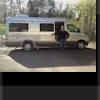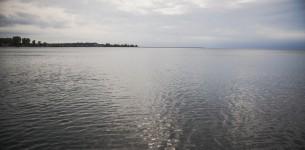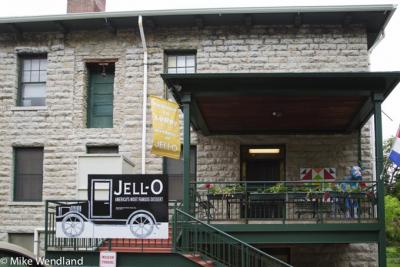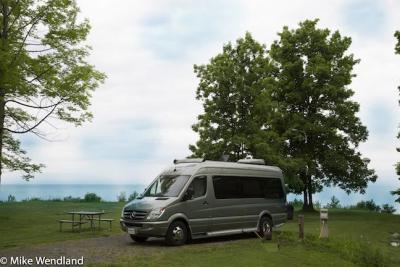The Great Lakes Shoreline Tour: Lakes Ontario and Erie
I always knew I was lucky to live in Michigan, the very heart of the Great Lakes. But until I started this drive along the shoreline of all five Great Lakes, I didn’t realize how fortunate I truly am to call this area home.
I also didn’t realize how interconnected they are. From a hydrological standpoint, they are all intermingled and pretty much part of one system. The water that passes the rocky northern Superior shore in Minnesota eventually makes its way to the sandy bluffs of Lake Ontario in upstate New York.
And until I started out in our Roadtrek Etrek motorhome moving west from near Cape Vincent, NY, I was unaware of the amazing diversity of the land, the history, culture, economic import, beauty and recreational opportunities that make the Great Lakes the largest system of fresh, surface water on Earth, containing 84% of the U.S. fresh water supply and 21% of the entire planet’s supply.
Our first leg took us from the eastern end of Lake Ontario in New York, on to Lake Erie in Pennsylvania and Ohio, north into Michigan and the start of the lake on the shores of the Lake Erie Metro Park, at the mouth of the Detroit River. Total distance was 702 miles.
We were plagued by cloudy skies and intermittent rain most of the way. I used my 4g LTE Verizon connection – something we had pretty much the whole route – to scout for nearby attractions.
Our first discovery was in Le Roy, NY, a half-hour from our campsite at the Lakeview State Park on the shores of Lake Ontario. Why Le Roy? Because that is where we found the Jell-O Museum and Gallery, an absolutely fascinating place that chronicles and celebrates America’s most famous desert.
In 1897, Pearle Wait, a carpenter in Le Roy, experimented and came up with a fruit flavored dessert which his wife, May, named Jell-O. He tried to market his product but he lacked the capital and the experience. In 1899 he sold his formula for the sum of $450.
The Jell-O Museum and Galley documents how the Jell-O’s success is a tribute to marketing and advertising. In 1904, a three-inch ad costing $336 in the Ladies Home Journal launched the printed portion of the campaign, and the first of the Jell-O “best seller” recipes rolled off the presses. In some years, as many as 15 million booklets were distributed. Noted artists such as Rose O’Neill, Maxfield Parrish, Coles Phillips, Norman Rockwell, Linn Ball, and Angus MacDonald made Jell-O a household word with their colored illustrations.
Salesmen, well-trained, well groomed, well versed in the art of selling went out in “spanking rigs, drawn by beautiful horses” into the roads, byroads, fairs, country gatherings, church socials, and parties to advertise their product. First came team-drawn wagons, to be followed by smart auto-cars. Pictures, posters, and billboards over the American landscape, as well as magazine, carried the Jell-O Girl and the then six delicious flavors into the American home.
Eventually, Jell-O was bought by General Foods and moved away from Le Roy. But the museum, staffed by local folk, is a delightful place of Americana nostalgia.
We moved from Lake Ontario to Lake Erie.
In Erie, PA, we spend a drizzly afternoon touring the 11-mile long, 3,200-acre sandy Presque Isle State Park, located on a peninsula that arches into Lake Erie. Besides numerous beaches, picnic areas and bike trails, the park boasts the Perry Monument, a 101 foot structure located at the eastern end of Presque Isle dedicated to Commodore Oliver Hazard Perry, who defeated the British fleet in the War of 1912.
Standing next to Misery Bay – so named by the men of Perry’s naval squadron, who wintered here 1813-1814 after the crucial Battle of Lake Erie in September 1813 – the monument reminds us that if Perry hadn’t won, much of the Midwest would now likely be Canada.
Further east into Ohio we overnighted on the shoreline at the Geneva State Park. In town, we visited the original old-fashioned soda fountain at the local drugstore where I had an early morning root beer float, the perfect way to start the day.
We were headed back west when Jennifer did an Internet search (that 4g LTE Verizon network and our Mi-Fi card in the Roadtrek is better than a travel guide) where we discovered that the area has over 17 covered bridges and more than a dozen local wineries.
The glaciated soil along the Grand River was laid there as the Great Lakes were being formed and is perfect for great grape production. At the Harpersfield Vineyard and Winery, we chatted up the winemaker himself and learned that the estate grown Pinot Noir and Chardonnay wines there are among the finest in North America.
Then it was on to Vermilion, Ohio, where we attended the town’s annual Festival of the Fish, a weekend event boat parades, races, pageants, contests, food, entertainment, markets. We wanted to stick around for the fireworks but stiff winds blowing off the lake had postponed them for a day.
While there, we met Christopher Gillcrist, executive director of the newly opened Great Lakes Historical Society Museum in Toledo. Gillcrest is a wealth of information about the Great Lakes and it’s importance.
From there, it was back west and then, at the state border, up along the coast into Michigan, where the entire stretch of the lake from the Detroit River mouth south to Monroe and Toledo is one of the probably the most prolific walleye fisheries on the continent.
Alas, the stiff winds following the storm front kept most boats in harbor during our visit.
Standing on the shore, watching the Detroit River empty into the lake it formed so many eons ago, we realized all that water in front of us originated from the upper lakes.
After a quick weekend home for Father’s Day, we looked forward to the next week 00when we would resume the shoreline tour – at the end of Lake Huron in Port Huron.
Be sure and send along your tips on what we should see. You can Tweet me using the #VZGreatlakes, #Roadtreking and #PureMichigan hashtags.
The native American’s who first lived on the shores of Lake Ontario in what is now upstate New York called it “the land of the shining water.”
The Jello Museum and Gallery in Le Roy, N.Y.
Our Lake Erie shoreline campsite at Geneva State Park in Ohio






0 Comments
Recommended Comments
There are no comments to display.
Please sign in to comment
You will be able to leave a comment after signing in
Sign In Now